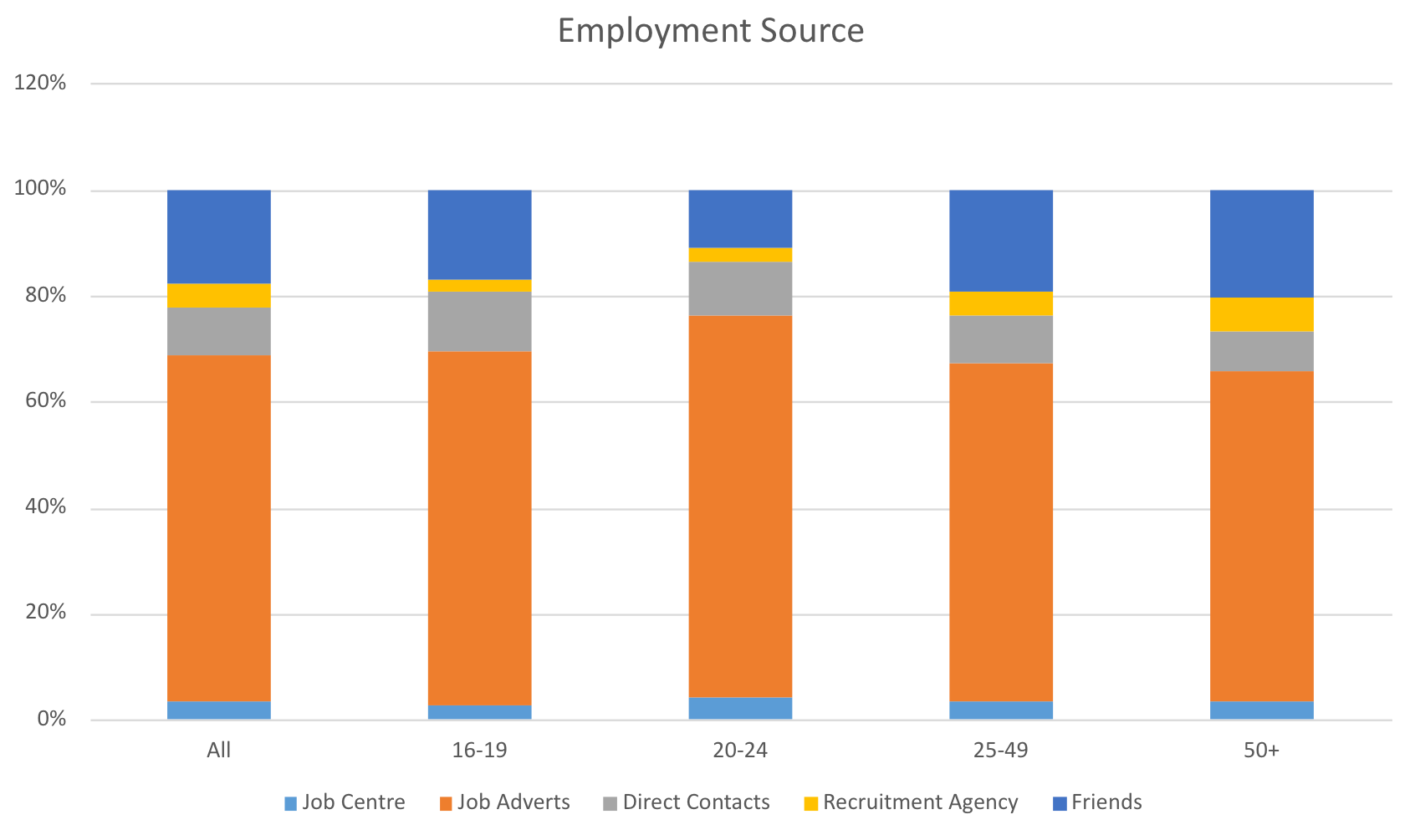How Do People Find Work According To The ONS

Welcome to our comprehensive guide, ‘How Do People Find Work According to the ONS.’ In today’s fast-evolving job market, understanding the dynamics of employment is crucial, both for those seeking jobs and for employers aiming to attract the right talent. This article delves into the latest data from the Office for National Statistics (ONS), offering valuable insights into the various methods people in the UK employ to find work.
Whether you are a job seeker navigating the complexities of the job market, or an employer considering where to advertise your next vacancy, this guide provides essential information to help you succeed in the current employment landscape. Join us as we explore trends, strategies, and tips that are key to understanding and capitalising on the UK’s job market.
Quick Links:
- Understanding The ONS Data
- Insights For Employers: Where To Advertise Jobs
- Trends In How Different Age Groups Find Work
- The Rising Influence Of Digital Job Search Platforms
- The Role Of Networking And Direct Contacts
- Utilising Recruitment Agencies
- Office For National Statistics And Labour Market FAQs
Highlights And Key Takeaways:
- People in the UK find work through Job Clubs, Job Centres, Job Adverts, Direct Contacts, Recruitment Agencies, and Friends.
- Online job adverts are the primary source for job vacancies in various industries across the UK.
- ONS data shows that the majority, 65.18%, find jobs through Job Adverts. Direct Contacts account for 8.92%, followed by Friends at 17.85%, Recruitment Agencies at 4.54%, and the Job Centre at 3.51%.
Understanding The ONS Data
The Office for National Statistics (ONS) plays a pivotal role in collating and analysing labour market data in the UK. Its surveys, particularly the Annual Population Survey, offer a comprehensive view of the job market, revealing essential insights into job vacancies and employment trends. This survey is a residence-based labour market exploration, delving into aspects of the population, economic activity (including employment and unemployment), economic inactivity, and qualifications. These elements are intricately broken down, where feasible, by gender, age, ethnicity, industry, and occupation, providing a detailed landscape of the workforce in the UK.
The significance of this survey conducted by the ONS cannot be overstated. It serves as a vital tool for the government, businesses, and the public, enabling informed decision-making and strategy development. The data spans across the UK, covering England, Wales, Scotland, and Northern Ireland, offering a comprehensive view that takes into account regional variations and trends. It provides a robust foundation for understanding the dynamics of job vacancies and employment within various industries and amongst different demographic groups.
In our analysis of the labour market, we focus on a specific segment of the ONS data that sheds light on how people in the UK find work. The data set categorises job finding methods into several channels: Job Club, Job Centre, Job Adverts, Direct Contacts, Recruitment Agencies, and Friends. These categories reflect the diverse ways in which individuals engage with the job market, whether it be through government-supported centres, personal networks, or private recruitment entities.
Each method of finding work offers unique insights into the labour market:
- Job Club and Job Centre: These are often government-supported initiatives, providing resources and guidance for job seekers.
- Job Adverts: This method, encompassing both online and offline adverts, is a primary source for job vacancies in various industries across the UK.
- Direct Contacts: This involves utilising personal and professional networks, highlighting the importance of connections in the job search process.
- Recruitment Agencies: These agencies act as intermediaries between employers and potential employees, playing a crucial role in matching job vacancies with suitable candidates.
- Friends: Leveraging friendships and social networks can often lead to potential job opportunities, underlining the social aspect of the job search.
By dissecting and understanding this data, both employers and job seekers can gain valuable insights into the most effective channels for recruitment and job hunting, respectively. This understanding is crucial in navigating the complex terrain of the UK’s labour market and making strategic decisions, whether one is offering or seeking employment.
Are you a job seeker struggling to find work or hunting for your first job? Get a head start on your competition by reading – I Can’t Find A Job (What Can I Do?) and How Do I Get My First Job? – A UK Guide.
Insights For Employers: Where To Advertise Jobs

Employers seeking to fill both full-time and part-time positions must navigate the complexities of the job market with precision. The Office for National Statistics (ONS) data provides invaluable insights into the most effective channels for job advertising, enabling employers to make data-driven decisions.
Analysis of the Most Effective Channels Based on ONS Data
The ONS data highlights that Job Adverts, particularly online platforms, are the most prevalent method of job discovery. This trend underscores the digital shift in job searching, making online job boards and company websites prime locations for advertising jobs. If you have a job advert ready to go, you can start job advertising here on online job boards. Alternatively, you can download a job description template, job advert template, or an editable job description example from our library of job descriptions.
Recruitment Agencies remain a significant channel, particularly for specialised or higher-level positions. These agencies can effectively match employer needs with candidate skills, streamlining the recruitment process.
Direct Contacts and networking are also shown to be effective, especially for industries where word-of-mouth and professional connections are paramount.
Trends in Job Advertising
There has been a notable increase in the use of digital platforms for job advertising. Social media and professional networking sites are becoming increasingly popular for reaching potential candidates. If you are interested in social media job advertising, we recommend reading – Social Media Hiring Strategies For SMEs, part of our free SME Business Guide To Cost Effective Recruitment.
Traditional methods, such as newspaper adverts and Job Centres, are still relevant for certain demographics and industries, but their overall impact is diminishing in the face of digital alternatives.
The Importance of Choosing the Right Platform
Selecting the right platform for job adverts is crucial. Employers must consider the nature of the job, the desired candidate profile, and where potential candidates are likely to seek employment.
For instance, LinkedIn might be more appropriate for professional, white-collar jobs, while platforms like Indeed could be better for a broader range of roles.
Tips for Targeting Different Age Groups and Demographics
Younger job seekers, typically looking for part-time or entry-level roles, are more likely to use online job portals and social media. Tailoring job adverts to be mobile-friendly and engaging on these platforms can attract this demographic. For tips on writing job adverts, read our blog – How To Write A Job Advert.
Older job seekers or those looking for more senior roles may prefer more traditional methods or specialised recruitment agencies. Ensuring job adverts are accessible through these channels can widen the employer’s reach.
Employers should also consider inclusive language and diverse representation in job adverts to appeal to a broader range of candidates across different demographics.
In conclusion, understanding the trends and effectiveness of various job advertising channels is essential for employers in the UK. By leveraging the insights from the ONS data, employers can strategically place their job adverts, ensuring they reach the most suitable candidates for their vacancies.
Trends In How Different Age Groups Find Work

The Office for National Statistics (ONS) data offers a rich repository of information, shedding light on how different age groups in the UK’s population approach job finding. This section will delve into the statistics, comparing and contrasting the methods favoured by younger versus older job seekers, and discussing how this data can be utilised by both employers and job seekers.
Detailed Breakdown by Age Group
- All Age Groups: The ONS data indicates that the majority, 65.18%, find jobs through Job Adverts. Direct Contacts account for 8.92%, followed by Friends at 17.85%, Recruitment Agencies at 4.54%, and the Job Centre at 3.51%.
- Ages 16-19: This group heavily relies on Job Adverts (66.93%) and Friends (17.04%). Job Centre (2.69%) and Recruitment Agencies (2.22%) are less utilised.
- Ages 20-24: Similar to the 16-19 age group, they predominantly use Job Adverts (72.23%) but with a higher reliance on the Job Centre (4.07%) and Recruitment Agencies (2.94%).
- Ages 25-49: This demographic shows a balanced approach with a slight preference for Job Adverts (63.90%), followed by Friends (19.13%) and Direct Contacts (8.74%).
Comparisons and Contrasts
Younger job seekers (16-24) show a significant inclination towards using Job Adverts and Friends, reflecting a more informal and digitally oriented approach. The 25-49 age group demonstrates a more diversified method, relying more on professional networks (Direct Contacts) and less on the Job Centre.
Older age groups (not detailed in the provided data but can be inferred) might lean more towards traditional methods and professional networks, given their longer career span and established connections.
Insights for Employers and Job Seekers
- Employers: Understanding these trends is crucial for any organisation looking to target specific age groups. For instance, digital and social media platforms are key for attracting younger candidates, whereas a more varied approach is necessary for the 25-49 demographic.
- Job Seekers: This data can guide job seekers in choosing the most effective job search methods for their age group. Younger individuals might benefit more from focusing on online platforms and leveraging their social networks, while those in the 25-49 age bracket might consider a balanced approach, including professional networking.
In summary, the ONS data provides invaluable insights into the job-seeking behaviour of different age groups. By interpreting this data, organisations can tailor their recruitment strategies effectively, and job seekers can optimise their job search methods, leading to more efficient and successful employment outcomes.
The Rising Influence Of Digital Job Search Platforms
The landscape of job seeking and recruitment has undergone a significant transformation with the advent and proliferation of digital job search platforms. This shift is evident in the increasing reliance on online job adverts and digital platforms in the current job market.
Prominence of Online Job Adverts and Digital Platforms
Online platforms have become the go-to resource for both job seekers and employers. The ease of access, wide reach, and the efficiency of these platforms have made them indispensable in the modern job market.
Digital job adverts allow for a broader and more diverse audience, reaching potential candidates who may not be actively seeking but are open to new opportunities. The integration of advanced technologies like AI and machine learning in these platforms has further streamlined the process, making job matching more efficient.
Tips for Employers on Creating Effective Online Job Postings
- Clarity and Conciseness: Ensure job descriptions are clear, concise, and include essential details such as responsibilities, qualifications, and experience required. You can find further tips on writing clear and concise job descriptions here – How To Write Job Descriptions.
- SEO Optimisation: Use relevant keywords to improve the visibility of the job posting on search engines and within the platform’s search function.
- Company Culture and Benefits: Highlight your company’s culture and the benefits of working there to attract the right candidates.
- Engaging and Inclusive Language: Use engaging and inclusive language to appeal to a diverse range of candidates.
- Call-to-Action: Include a clear call-to-action, guiding candidates on how to apply.
For more detailed strategies, refer our guides – How To Advertise A Job and How To Hire Employees.
Advice for Job Seekers on Utilising Online Resources to Find Work
- Profile Optimisation: Create and optimise profiles on job platforms, ensuring they are up-to-date and showcase your skills and experience effectively.
- Use of Filters and Alerts: Utilise filters to narrow down job searches according to your preferences and set up alerts for new postings.
- Networking: Leverage digital platforms for networking. Engaging with industry professionals and joining relevant groups can open up more opportunities.
- Researching Companies: Utilise online resources for career research. Informative blogs like Career Research: How To Research Career Paths can provide valuable insights.
- Applying Strategically: Tailor your applications for each job, highlighting how your skills and experience align with the job requirements.
Understanding the costs involved in using these platforms can also be beneficial. Recruitment articles such as How Much Do Recruitment Agencies Charge and How Much Should I Spend On Indeed UK offer insights into the financial aspects of job searching and recruiting on digital platforms.
In conclusion, the rise of digital job search platforms has revolutionised the recruitment process. Employers and job seekers who adeptly navigate these digital avenues are likely to experience more success in the ever-evolving job market.
The Role Of Networking And Direct Contacts

In the pursuit of employment, whether it’s for full-time positions or temporary roles, networking and direct contacts remain integral components. These traditional methods hold significant value in the job market, often leading to opportunities that might not be visible through conventional job adverts.
Importance of Networking and Direct Contacts
Networking and establishing direct contacts offer a more personalised approach to finding jobs. It’s not just about who you know but also who knows you.
In many industries, a substantial number of vacancies are filled through referrals and direct contacts, often before these opportunities are publicly advertised. Networking provides recognition within your industry, which can be crucial for career advancement.
Strategies for Employers to Leverage Networking for Recruitment
- Industry Events and Conferences: Participating in industry events and conferences can be an excellent way for employers to build a network of potential candidates.
- Employee Referral Programs: Implementing employee referral programs can incentivise current employees to refer qualified candidates from their network. Further information on implementing employee referral programs is available in our guide – Introducing An Employee Referral Scheme.
- Professional Associations and Groups: Joining and being active in professional associations can help employers get in touch with potential candidates who are already recognised in the industry.
- Alumni Networks: Leveraging alumni networks of colleges and universities can provide access to a pool of qualified candidates.
Tips for Job Seekers on Building and Utilising a Professional Network
- Attending Industry Events: Attend industry conferences, seminars, and workshops to meet professionals in your field.
- Social Media Platforms: Use platforms like LinkedIn to connect with industry leaders, join relevant groups, and participate in discussions.
- Informational Interviews: Arrange informational interviews with industry professionals to gain insights and make valuable contacts.
- Volunteering and Internships: Volunteering or internships in your desired industry can help you build a network and register your presence.
- Staying in Touch: Maintain contact with your network, offering and asking for help when needed, to keep the relationships active and mutually beneficial.
For job seekers, the aim is to build a network that not only helps in finding jobs but also contributes to professional growth and industry recognition. For employers, leveraging networking for recruitment adds a layer of personal recommendation and insight into a candidate’s capabilities, which can often be more telling than a CV or an interview.
In essence, networking and direct contacts add a dynamic layer to the job-hunting and recruitment process, underscoring the importance of personal connections and industry involvement. Whether you are seeking employment or looking to hire, investing time and effort in building and maintaining a robust professional network can yield significant dividends.
Utilising Recruitment Agencies
Recruitment agencies play a pivotal role in the job market, acting as a bridge between employers and job seekers. Their expertise and services can be invaluable for both parties in navigating the often complex terrain of recruitment.
Role and Benefits of Recruitment Agencies
- For Employers: Recruitment agencies can significantly streamline the hiring process. They provide a pre-vetted pool of candidates, saving time and resources for the employer. Agencies have a deeper understanding of the market and can offer insights into salary rates, available skill sets, and hiring complexities.
- For Job Seekers: Agencies offer access to a wider array of job opportunities, some of which may not be advertised publicly. They can also provide candidates with constructive feedback, career advice, and negotiate employment terms on their behalf.
Advice on Selecting and Working with Recruitment Agencies
- Research and Select Carefully: Whether you’re an employer or a job seeker, it’s crucial to choose an agency that specialises in your industry or the type of roles you’re interested in.
- Clear Communication: Clearly communicate your needs, expectations, and preferences. For job seekers, this includes your career aspirations, desired salary, and preferred job locations. Employers should provide a detailed job description and company culture insights.
- Build a Relationship: A strong, ongoing relationship with a recruitment agency can be beneficial. They can better understand your long-term needs and provide more tailored services.
Hiring People – Flat Fee Recruitment Agency
Among the UK’s leading flat fee recruitment companies, Hiring People stands out for its effective and efficient services. They offer a unique model that allows employers to maximise their recruitment reach for a fixed fee, making it a cost-effective solution.
Hiring People specialises in a broad range of industries, providing employers with access to a diverse pool of talented candidates. Their comprehensive service includes advertising the position across multiple job boards and targeted outreach to potential candidates.
Hiring People is known for its personalised approach, ensuring that both employers receive tailored assistance that aligns with their specific requirements. Their commitment to understanding the unique needs of each client sets them apart in the recruitment industry.
In summary, utilising recruitment agencies like Hiring People can provide significant advantages for both employers and job seekers. Employers benefit from a streamlined recruitment process and access to a broad talent pool, while job seekers gain exposure to a variety of job opportunities, including those not publicly advertised. By choosing the right agency and building a strong working relationship, both parties can optimise their recruitment or job search process, leading to successful employment outcomes.
Office For National Statistics And Labour Market FAQs
Next, we tackle your questions about the UK statistics authority and labour market analysis and data:
IS THE ONS SURVEY GENUINE?
Absolutely, the Office for National Statistics (ONS) survey is indeed genuine. The ONS is the UK’s largest independent producer of official statistics and is globally respected for its integrity and impartiality. Its surveys are conducted to gather essential data on various aspects of the UK’s economy, society, and population.
The ONS research is meticulously compiled and presented in a user-friendly format on their official website. This includes detailed reports, statistical bulletins, and interactive data visualisations. Furthermore, their findings are often shared through press releases, social media platforms, and collaborations with news agencies, ensuring wide accessibility and public engagement.
In the UK, job seekers have various avenues to find full-time or part-time employment, or temporary work. Common methods include online job portals like Indeed and Reed, recruitment agencies, company websites, professional networking sites like LinkedIn, and job fairs. Additionally, utilising connections through personal networks or professional groups can be highly effective. It’s also advisable to consider the National Careers Service for guidance and support in job hunting.
The ease of finding work in the UK can vary greatly depending on factors like the industry, location, current economic climate, and the individual’s qualifications and experience. Some sectors have a high demand for workers, making job searches relatively easier in those areas. However, in some fields, particularly specialised ones, the competition can be quite fierce. Staying informed about market trends and continuously upskilling can significantly enhance employment prospects.



